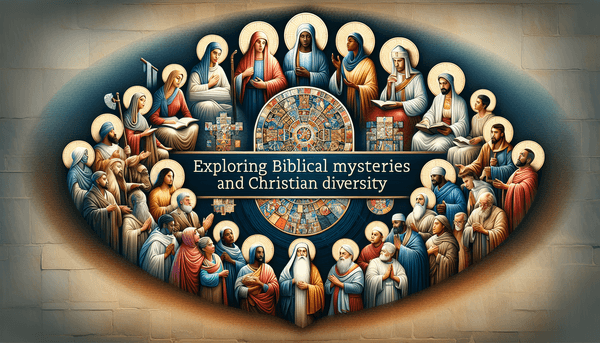Discerning True from False Teachings
The Christian faith mandates vigilance against false teachings that threaten to lead believers astray. The Apostle Paul, in 2 Corinthians 10:5, exhorts us to 'demolish arguments and every pretension that sets itself up against the knowledge of God, and we take captive every thought to make it obedient to Christ.' This powerful command reminds us of our responsibility to actively refute doctrines that conflict with the Gospel. Similarly, the writer of 2 John 1:9 warns, 'Anyone who runs ahead and does not continue in the teaching of Christ does not have God; whoever continues in the teaching has both the Father and the Son.' It is clear that deviating from the core teachings of Christ is a perilous endeavor. Jesus Himself cautions us in Matthew 7:15 to 'Beware of false prophets, who come to you in sheep's clothing but inwardly are ravenous wolves.' The early church faced such challenges, as seen in Galatians 1:8, where Paul starkly states that even if an angel preaches a different gospel, they are to be accursed. The Spirit echoes this sentiment in 1 Timothy 4:1, warning of deceitful spirits and doctrines of demons in later times. These verses provide a clear biblical mandate to reject false teachings and uphold the truth of the Gospel.
Where to Start in the Bible
For those embarking on the journey of reading the Bible, beginning with the book of Genesis is akin to opening the first chapter of a grand narrative. Genesis lays the foundation of the world and sets the stage for the human story in its relationship with the Divine. 'In the beginning, God created the heavens and the earth,' (Genesis 1:1) is a profound statement that establishes the universe's origin. As readers progress through the Scriptures, they transition from the Old Testament, with its focus on the Law, to the New Testament, which reveals the message of grace through Jesus Christ. The life and teachings of Jesus are central to Christian faith, as evidenced in Luke 24:27, where Jesus explains to His followers how the Scriptures point to Him. In the New Testament, John begins his gospel by mirroring Genesis, stating, 'In the beginning was the Word,' (John 1:1) introducing Jesus as the divine Logos. The Berean believers demonstrate the importance of scripture in Acts 17:11, where they are commended for examining the Scriptures daily to see if Paul's teachings were true. These passages guide us to approach the Bible not just as a book to be read, but as a source of divine revelation and truth.
Understanding the Trinity
The doctrine of the Trinity stands as a cornerstone of Christian belief, yet it remains one of the most profound mysteries of faith. This belief posits that one God exists in three distinct persons: the Father, the Son (Jesus Christ), and the Holy Spirit. Though the term 'Trinity' does not appear in the Bible, the concept is deeply rooted in Scripture. In Matthew 28:19, Jesus commands His disciples to baptize believers 'in the name of the Father and of the Son and of the Holy Spirit,' affirming the Trinitarian understanding of God. Moreover, understanding the Trinity can offer comfort during times of grief, as explored in our related article, which delves into finding solace in scripture. Furthermore, Jesus expresses His unity with the Father in John 10:30, declaring, 'I and the Father are one.' The apostle Paul extends a Trinitarian blessing in 2 Corinthians 13:14, invoking the grace of Jesus, the love of God, and the fellowship of the Holy Spirit. The Gospel of John also records Jesus speaking of the Father who will send the Holy Spirit in His name (John 14:16-17). Finally, the apostle Peter refers to the work of the Trinity in the lives of believers in 1 Peter 1:2. Through these scriptures, we gain insight into the complex yet unified nature of God as presented in Christian theology.
Conclusion
As we conclude this exploration into key biblical themes, it is our hope that the insights shared here have offered clarity and encouragement for your faith journey. Whether you are contending with false teachings, seeking a starting point in Scripture, or grappling with the concept of the Trinity, the Bible provides the guidance necessary for a steadfast walk with God. As you reflect on the wisdom of sacred texts, consider delving deeper into the symbolism and teachings of the Bible, such as the journey of the Magi and their significance in Christian epiphany. May the verses and principles discussed serve as a beacon, illuminating the path to a deeper understanding and a more profound relationship with the divine. Let us continue to delve into the sacred Scriptures, embracing the wisdom and knowledge that come from a life anchored in the Word of God.
FAQ
Q: What Bible verses tell us not to respect false teachings?
A: The Bible cautions against false teachings in several verses, including 2 Corinthians 10:5, which advises to 'demolish arguments and every pretension that sets itself up against the knowledge of God.' Additionally, 2 John 1:9 warns against deviating from Christ's teachings, and Matthew 7:15 cautions against false prophets disguised as harmless sheep.
Q: What's the Trinity?
A: The Trinity is a fundamental Christian doctrine that defines God as one being in three persons: the Father, the Son (Jesus Christ), and the Holy Spirit. This concept, while not explicitly named in the Bible, is derived from passages like Matthew 28:19, which refers to the Trinitarian formula for baptism.
Q: Where do I start in the Bible?
A: You can start reading the Bible from the book of Genesis, which narrates the story of creation and the early history of God's people. This provides the foundational context for understanding the rest of the Scriptures.
Q: Lay your questions at His feet; begin a heavenly discourse.
A: This poetic phrase encourages us to approach God with our questions and uncertainties, trusting in His wisdom to guide us through our spiritual inquiries and the study of His Word.






